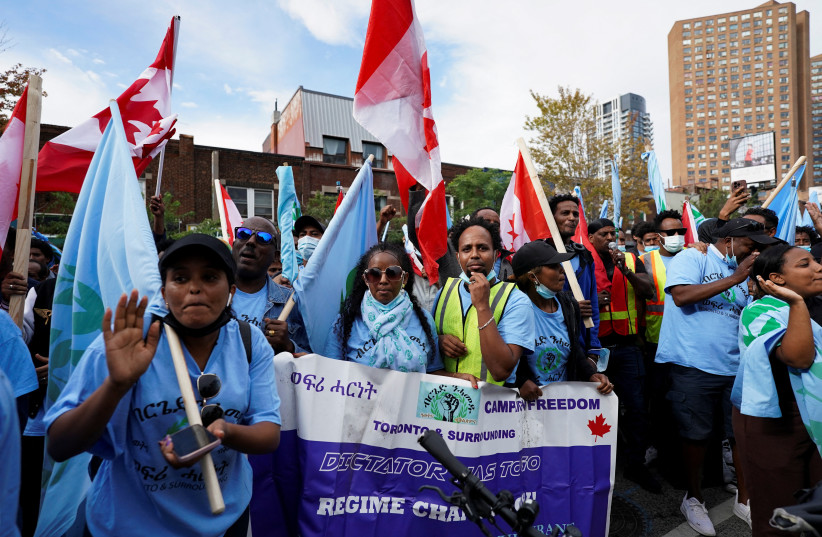Violent protests against Eritrea govn’t are an international occurrence
The violence that broke out on Saturday in Tel Aviv during protests outside the Eritrean embassy was not the first event of its kind, in Israel or internationally. Similar protests and riots against the Eritrean government have occurred around the world with increasing frequency this year.
Eritrean embassies annually host global festivals, which the regime’s opponents view as a show of power by the government. Anti-government protesters claim the regime is persecuting them through the embassies by monitoring and tracking Eritrean refugees.
Clashes in Sweden
During a festival in August dedicated to Eritrea’s cultural heritage, opponents of the government claimed that it was a tool to promote the dictatorial regime and a source of funds for the president.
“This is not a festival, they are teaching their children hate speech,” one protester said.
 Anti-government protestors stand outside a pro-Eritrean government fundraising meeting in Toronto, Ontario, Canada September 2, 2023. (credit: REUTERS)
Anti-government protestors stand outside a pro-Eritrean government fundraising meeting in Toronto, Ontario, Canada September 2, 2023. (credit: REUTERS)Violent clashes broke out between supporters of the regime and its opponents. According to local media, protesters dismantled tents set up in honor of the festival and set cars on fire. Dozens were injured and around 200 people were arrested.
The Swedish Minister of Justice strongly condemned the conflicts and stated: “These internal conflicts will not enter our country. If you fled the violence and came to Sweden, you must not cause violence here, police resources are needed for other purposes.”
Clashes in Canada
Violent clashes also broke out in Canada during a festival held in Toronto at the beginning of August, in which dozens of people were injured. Canadian police said that the clashes broke out after one of the tents set up for the festival was set on fire. There were many protests against the festival and a petition was created calling for the event to be cancelled.
“The event is funded by the totalitarian regime of Eritrea through activists in Toronto in order to raise funds to finance the military establishment,” the petition read. “The Eritrean government is one of the most oppressive regimes in the world, and it continues to commit gross violations of human rights and war crimes.”
Human rights in Eritrea
Eritrea is a one-party state and has been ruled for 30 years by President Issays Afwerki. There are no elections and opposition is violently suppressed.
Human rights organizations around the world have regularly condemned the president and government as “a one-man dictatorship, no legislature, no civil society organizations or independent media, and no independent judiciary.”
The country is ranked 174th in the Freedom of the Press Index, 176th in the UN Human Development Index, and 162nd in the Global Corruption Index.
“Many fled the oppression in Eritrea, they have to look back at every given background and fear every word they say,” said Joan Nanyuki, the head of the East Africa branch at Amnesty International. “They are afraid of the long arm of the government in Eritrea.”
According to Amnesty International, government officials and supporters of the regime use “various tactics to harass and intimidate critics of the regime. The tactics include threats, physical assault, and spreading lies.”





Comments are closed.